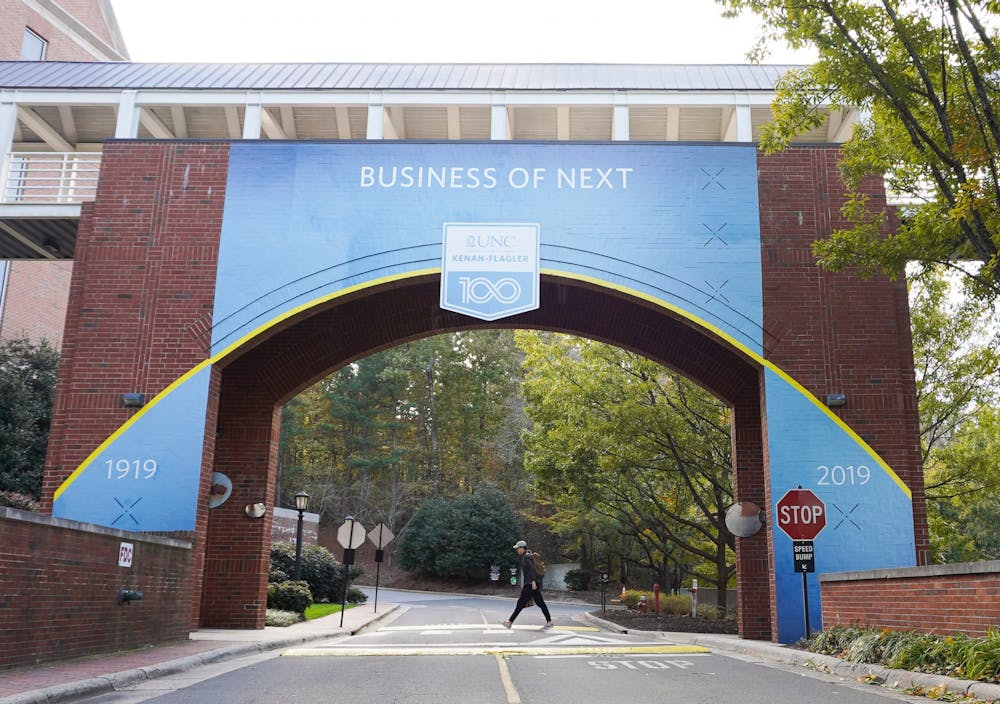Loneliness, anxiety and a lack of connection are major forces that negatively impact the business school and UNC as a whole, according to Spark's website.
“These micro-connections you can enjoy day to day can actually make a huge impact on your well-being and your mental health," said Michael Penny, associate director of student engagement and a member of the Spark team. "And it doesn't take much to make those micro-connections, but when you build them up day to day, class to class, week to week, it can really make a big impact individually and as a community.”
Millar said the business school has been looking to put more time, effort and energy into a new undergraduate on-boarding program for some time. Specifically, a team of five faculty and staff members from the school have spent the past few years thinking strategically about the best way to welcome students.
"But until recently we didn’t really have a student engagement arm of our staff team, so it’s been difficult to give it the time, the love, the energy that it has needed in the past," she said.
According to Shimul Melwani, a professor at the school and a member of Spark, the team set out to redesign the orientation with three specific goals in mind: to inform, inspire and connect students.
“What I’m hoping for more than anything is that we really see in some ways a stronger, more positive, more supportive and more cooperative community of students, who feel like they can really bring their entire selves and their identities into the business school,” Melwani said.
Because the orientation is significantly different from Engage, the team decided to name the new orientation Spark.
“We really saw it in some ways as exactly that, the spark that would light the fuse to your next experience – spark your journey, spark your career, spark your global adventure, spark your relationships,” Melwani said.
This year's Spark program, hosting almost 400 new admittees, was a two-day kickoff from Nov. 8 to 9 in the Great Hall and Kenan-Flagler Business School.
Attendees were divided into six cohorts of about 60 students in order to facilitate student interaction, each one having its own assigned Spark ambassador.
In contrast to Engage, Spark’s format and use of smaller groups emphasizes meeting and interacting with others, with several teamwork activities such as a scavenger hunt and a design thinking simulation, according to the program's website.
“One of the things that I’ve always heard about the business school is that a lot of your work is collaborative, so reflecting that in the orientation was really powerful just because it’s more of an accurate representation of what your work is going to be like in the business school, and also just in real life,” Bella Church, a sophomore attendee, said.
To get the day's news and headlines in your inbox each morning, sign up for our email newsletters.
Canney said that while Kenan-Flagler has structured classes to involve collaborative work, he does not think they have used the right message and tone in the past to promote a community culture. He believes that may be changing with the implementation of Spark.
The Spark team not only hopes to enhance relationships between new students, but also between all students within the business school, Penny said.
“When all the students have gone through Spark and have been assigned to cohorts, there will be some horizontal community-making within each year, but then some vertical connections from seniors, juniors and sophomores,” Penny said.
Bahtia and Canney said they both think that during their time in the business school, the competitive, cutthroat environment has lessened. They think Spark will continue that effect.
“I think that Spark gives me the nascent impression that if I was to come back to an alumni thing in a few years that the b-school will be completely different,” Canney said. “It is absolutely setting up a completely opposite culture to what we had before, which was, yes, very competitive, very individualistic high-achievers — whereas Spark has already set up all these people to collaborate, to be supportive with each other and to be with each other through the whole experience.”
Bahtia said she hopes the new orientation program helps change perceptions of business school students on-campus.
"It's like the snake culture is trying to go away," Bahtia said. "That's the whole point of Spark — it's like, turn students from snakes into samaritans."
university@dailytarheel.com



